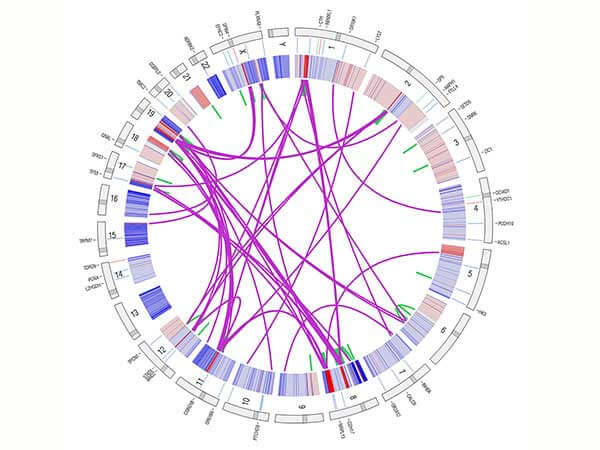The Importance of Cancer Genomics Research
The study of cancer genomes (all the DNA in cancer cells) has revealed the mind-boggling complexity of genomic changes that drive cancer growth and survival. This knowledge has greatly expanded our understanding of how cancer develops and progresses. Ultimately, it has led to new ways of diagnosing and treating cancer, as well as new ways of identifying those at high risk of developing cancer. In short, genomics research has changed the way we see cancer.
Large-scale research projects such as The Cancer Genome Atlas (TCGA), and its pediatric counterpart Therapeutically Applicable Research to Generate Effective Treatments (TARGET), have surveyed and cataloged the genomic changes in multiple types of cancer. The discovery of novel cancer-associated genetic changes has led to an explosion of therapies that target specific changes and tests that identify patients whose cancers harbor those changes—an approach to cancer treatment known as precision medicine.
Genomics studies have also revealed unexpected genetic similarities across different types of tumors, shifting the way we define cancer. Treatments are typically given based on the tumor’s location in the body, such as the brain or lung. But a handful of new cancer drugs are used to treat tumors with specific genetic or molecular features, no matter where in the body the cancer started growing.
On the other hand, genomics research has also shown how different cancers can be, even when they started growing in the same organ. This finding has helped explain why some subtypes of tumors grow at different rates and why cancer treatments don’t work the same way in every patient.
NCI plays a key role in large-scale genomics research by facilitating collaborations between scientists of different disciplines, providing funding, and providing access to state-of-the-art technologies, data sets, and other resources.
In addition to genomics, cancer researchers are also creating large-scale catalogs of other kinds of molecular changes in cancer, including epigenomic, transcriptomic, proteomic, and metabolomic changes. These studies have further expanded our understanding of cancer and have led to new ideas for treating it.
The results of these projects illustrate the wide-ranging variation of genetic and molecular changes in cancer, and provide a better understanding of what causes cancer at the molecular level.
Selected NCI Activities in Cancer Genomics Research
Exploring the genetic and molecular foundations of cancer is a vital part of NCI’s research efforts. The following list highlights NCI-led or NCI-funded activities related to genomics and other “omics” research.
Building Genomics Data Sets
Large-scale research projects use omics technologies to catalog the molecular changes in multiple types of cancer.
- The Human Tumor Atlas Network is constructing 3-dimensional atlases of human cancers as they change over time, including single-cell analyses of genomics, epigenomics, and transcriptomics. The network is generating adult and pediatric atlases and strives to include minority and underserved patients across cancer types and stages of disease.
- The Clinical Proteomic Tumor Analysis Consortium is using large-scale proteomic and genomic analyses, or proteogenomics, to characterize multiple types of cancer. The consortium is also using proteogenomics to answer questions about toxicity and resistance in clinical trials of new cancer drugs.
- NCI leads several projects to molecularly characterize large collections of cancers as well as collecting a rich profile of clinical features and outcomes. The Genomic Data Analysis Network develops cutting-edge computational tools and performs an initial analysis of the data from these projects, providing a launching pad for a broad community of researchers.
- The Participant Engagement and Cancer Genome Sequencing (PE-CGS) Research Network, a Cancer Moonshot initiative, is using direct participant engagement approaches to promote cancer genome sequencing programs for rare cancers, highly lethal cancers, cancers that occur at an early age, cancers that disproportionately affect certain populations, and cancers that are prevalent in understudied populations.
- The Childhood Cancer Data Initiative (CCDI) is gathering clinical care and research data—including genomics data—from children, teens, and young adults with cancer. CCDI has also created infrastructure to share this data with researchers to help them learn faster and on a larger scale than is possible for any single institution.
Connecting Genomics Data to Cancer Biology
NCI conducts and supports research to find out how genetic and other molecular changes in cancer cells affect cancer development, cancer progression, and treatment response.
- The Cancer Target Discovery and Development Program is a network of research centers devoted to studying how molecular changes found in cancers affect cancer cells and explore opportunities to target those changes with new therapies.
- The Epidemiology and Genomics Research Program supports research in human populations to understand genomic determinants of cancer occurrence and cancer outcomes, and translate findings to clinical and public health interventions.
- NCI researchers use molecular and genomic profiling to study the causes of cancer. This enables a better understanding of how normal cells transform into cancer cells, and to pinpoint internal processes and external exposures associated with specific molecular or genomic subtypes of cancer.
- The Cancer Systems Biology Consortium integrates and analyzes large omics data sets to get a birds-eye view of the molecular changes in cancer, how these changes interact with one another, and how they change over time and space.
Using Genomics in Clinical Trials
NCI clinical trials are among the first to use genomic testing to match patients to cancer treatments based on the genetic changes in their tumors.
- ComboMATCH is a group of clinical trials that are using genetic testing to find genetic changes in patients’ cancers and potentially match them to combinations of cancer treatments that target those genetic changes.
- ALCHEMIST is a set of precision medicine lung cancer trials designed to evaluate whether adding targeted therapy based on patients' tumor genetics can help prevent lung cancer from returning after surgery.
- NCI-COG Pediatric MATCH is an international cancer treatment clinical trial for children, teens, and young adults that is testing the use of precision medicine for childhood cancers.
Genomics Data Sharing
NCI has spearheaded genomic data sharing practices since the first large-scale genomic characterization study, TCGA. NCI’s support for cancer omic data sharing continues by striving to make data as accessible as possible while protecting patient privacy.
The Cancer Research Data Commons is a cloud-based data science infrastructure that provides secure access to a large, comprehensive, and expanding collection of cancer research data, including data from TCGA, TARGET, and CCDI. Users can explore and use analytical and visualization tools for data analysis in the cloud.
Recent Research Findings in Cancer Genomics
- Analysis identifies 50 new genomic regions associated with kidney cancer risk
- For childhood cancer survivors, inherited genetic factors influence risk of cancers later in life
- NCI’s ComboMATCH initiative will test new drug combinations guided by tumor biology
- New Way to Classify Meningioma Brain Tumors Suggests Potential Treatments
- NIH study illuminates origins of lung cancer in never smokers
- International study of rare childhood cancer finds genetic clues, potential for tailored therapy
- International research teams explore genetic effects of Chernobyl radiation



